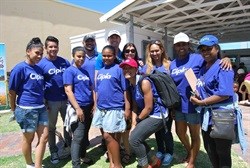
Top stories






More news


Marketing & Media
Ads are coming to AI. Does that really have to be such a bad thing?














The event marked the one-year anniversary since the opening of the clinic which acts as a support service to the currently under-resourced and burdened healthcare system in the country.
According to David Grier, Managing Trustee of the Cipla Foundation, many people take access to basic health screenings for granted. "Health screenings play a critical role in identifying health problems at an early stage and bettering the chance for effective treatment. Even if a person feels perfectly healthy, they could be suffering from a particular disease or condition they do not even know about, which is why it is vital for everyone to partake in regular health screenings."
Over 150 people were bussed to the clinic while an additional 100 located proximal to the clinic arranged their own transport to receive health screenings. Each patient could select up to three of the following health screenings made possible by additional partners: oral hygiene (Owethu and Pebbles Project); cancer awareness and breast examinations (Pink Drive); glucose/blood pressure (Owethu and Pebbles Project); women's health: pap smears and birth control (Department of Health); eye screening (private optometrist); HIV/AIDS awareness and consultation (@Heart); menstrual hygiene management (My Own Cup) and mental health (Cipla Mental Health in partnership with Kraaifontein Nurses).
In addition, Country Fair donated chicken and provided a braai, with the help of staff volunteers, catering for all patients who attended. Cipla employees were also on site to assist at each of the stations, help patients fill in their registration forms and usher patients to their respective screening stations.
The data collected at the registration will be captured to allow the clinic to increase its patient data base, says Grier. "This information will be shared with DoH so to identify the state facilities at which they are currently registered, which will allow the partnership between DoH and Owethu to work efficiently so not to duplicate services to the communities, such as chronic dispensing units/alternative collection points."
Grier explains that the clinic is made of modular pods and can be deployed anywhere. "The clinic is a breakthrough in the development of sustainable healthcare solutions to communities in need, especially as its scale and state-of-the-art facilities have been developed with community healthcare in mind. The clinic has been developed in a manner allowing the pods to be re-deployed within a community should this be needed."
Grier says that the Cipla Foundation, through its various projects, works with existing NGOs who already have a presence in certain communities which have been identified with a prevailing need for healthcare services. "This way we ensure that the community is involved and invested in a project's sustainability while the Cipla Foundation oversees the rollout of the entire project."
Paul Miller, CEO of Cipla, says that South Africa's primary healthcare system is in need of major resource assistance, and this initiative aims to build relationships with these communities by bringing affordable medicine to those most in need. "This is an initiative that will change the primary healthcare industry in the country, and possibly even on the continent. We therefore encourage corporate South Africa to get involved alongside Cipla Medpro in this pioneering initiative, and thereby, assist in closing this gap present in most communities.
The cost of the clinic's development is R2.2 million with the funding model making provision for corporations to subsidise their staff's medical costs. Grier explains that all medical treatment will be affordable to those in the communities and cost less than that of private healthcare.
For more information on Owethu or to get involved in this project, please visit www.owethu.co.za.